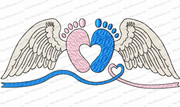We had to manually split my chart on fertility friend because it seems my body is deciding to skip the month of August as far as pregnancy, or having AF visit me.Today would be CD49. No AF still. Because we split my chart, it is technically CD4, but technically it is CD49, without the split.
 |
| August Chart, Before Splitting |
 |
| Septembers Chart *continuation of August, since there has been no AF visit yet* |
PCOS is very frustrating. I just want to be normal again. I just want my hormones to be regulated. I just want to hold my planned second child in my arms and feel the love I felt when I held Gabriella the first time. I want to have my birth go the way I want, and want my family to be complete... not that were not right now, but ever since my loss of Kayleigh, I've felt like something is missing.
Do you ever have days where you just want to give up trying, and just let it happen if it was meant to happen. The thought has crossed my mind recently, because I recall loosing my daughter Kayleigh, and than months later finding out about my daughter Gabriella. I find myself battling that if I gave up TTC, that it would be an unplanned pregnancy. I find that if we are TTC that it will be planned.
Looking back at events in my life, and how fertility and trying for babies, and conceiving them, loosing them, and such has occurred, I came to the following conclusion.
Out of my 5 miscarriages, the farthest was 12.5 weeks. That was in September 2011, when I managed to get pregnant on my Mirena IUD. They had me sign consent forms to remove my IUD. The choice was keep it in and bleed internally, and have Gabriella have no parents, or remove it, and miscarry. I miscarried.
The one before that was in 2010. Than in 2009. Than in 2008. and 2007. It seemed like I had one miscarriage a year. Atleast.
For all of them, I did not know I was even pregnant on, because I had no period, used protection and ended up in the ER with excruciating pain, being diagnosed with a miscarriage. None required a D+C, they just gave a medication to clean me out.
Than you factor into the equation, I had 1 stillborn in 2008 as well. That stillborn was 23 weeks along but measured 20 weeks.. I lost her due to a congenital heart defect called HLHS. My placenta also was abrupted and had 5 clots in it. Basically she had half of a heart and because of the clots in her placenta, it deprived her of life.
It was a very rough year for me. I basically gave up and than once I gave up, I found out about my daughter Gabriella, when I was 11.5 weeks along with her in Nov 08.
So I have realized that when you give up trying, it may just happen, but at the same time, I have to constantly be reminded about this disease. PCOS. I take medication daily for it to regulate my hormones. I have to take medications to regulate my insulin hormone, and regulate my thyroid hormones.
So its a battle I have to face. Do I continue TTC, or do I just go with the flow, and let things happen. Do I be constantly reminded of my condition, or do I have fun, and relax? Do I give up hope on wanting another child, or don't I....



 Born: June 25th 2009
Born: June 25th 2009





